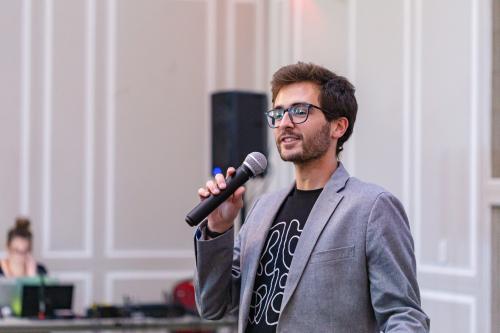Anthony Sartori, PSYC '18
If you’re walking around campus and happen to run into Department of Psychology alumnus Anthony Sartori, B.A. ’18, be sure to say congratulations.
Sartori, who was one of three alumni presented with Rising Terp Awards by the University of Maryland Alumni Association at a recent Terps Under 30 event, finds himself traveling from his Baltimore hometown to College Park roughly once per week, if not every other week. He does so to continue engaging with the Do Good Institute, the campus entity that supported him in the days leading up to the launch of his now three-year-old mental health nonprofit, Evolving Minds.
“We're almost three years old now, and I'm surprised to say that this will probably be the hardest year yet because we have clarity about who we are, but there is a lot of doubt, good doubt, about the ways that we've approached programing in the past, how we want to change that programing to really be transformative in the future,” Sartori explained. “The Rising Terp Award is a really nice and timely recognition and honor because of that doubt we’ve been experiencing recently. It is helpful to know that we're on the right path and have the university’s support.”
The university’s support of Satori and his vision for helping others take care of their mental health began in 2018, when he and his Scholars Promoting and Revitalizing Care (SPARC) team competed for funding at the Do Good Institute’s annual Do Good Challenge. SPARC, a UMD student group co-founded by Satori that works to “bring more awareness to the mental health issues faced by college students … and to advocate for greater wellness and self-care amongst students in Scholars and at the University of Maryland,” won $2,500 for its second-place finish, and an additional $2,500 through an Audience Choice Award.
“SPARC came about because of a fundamental need that I recognized within myself, which was that it's so incredibly difficult to build meaningful relationships, even in a living-learning program like College Park Scholars where you're surrounded by people all the time,” Sartori recalled. “I was suffering a lot with my mental health, I couldn't focus in any of my classes, and nothing was really clicking. And then when I landed in psychology, which a lot of my Scholars friends were studying, I was like, ‘Oh wow, this makes a lot of sense,’ and then I just fell in love with it.”
Proving just that, Sartori took a job as a mental health professional after graduation, and then quickly found the inspiration for what would eventually become Evolving Minds while working part-time at MOM’s Organic Market in Baltimore in early 2020.
“I was a part of the grocery store retail labor system, which is just really destructive on people's mental health and well-being because there are two really fundamental needs that aren't being met for retail workers: Time and space to build community and connection with coworkers,” he said. “Being in that work environment and seeing the impact of the retail work system, and then the impact of COVID-19 on retail workers as well, energized me to pursue a mental health framework that really centers the workers voice and promotes worker justice.”
Sartori promptly piloted a mindfulness program with Baltimore City Public School Educators, and a mental health framework Mom’s Organic Market. Then, because of COVID-19, Sartori shifted everything he piloted to an online environment. He took the time to develop programs for various other kinds of organizations—including retailers, social impact organizations and fellow nonprofits—and while simultaneously participating in the Do Good Institute’s Scale Your Impact Program, officially launched Evolving Minds in May 2020.
Since then, Evolving Minds has worked with more than 200 Baltimore City educators, the nonprofit Our Minds Matter, and more than 500 staff and students across campus—a number Sartori is hoping to grow through partnerships with additional campus colleges, departments and other organizations.
Until then, or until their paths serendipitously cross, Sartori offers students this advice: “Take the time to find ways to love yourself. I used to spend a lot of time in the [UMD Memorial] Chapel garden meditating and learning how to accept myself for who I am, and that’s something that’s not taught in classes.”
To learn more about potentially partnering with Evolving Minds, email Anthony directly at anthony [at] evolving-minds [dot] org.

Published - May 1, 2023



